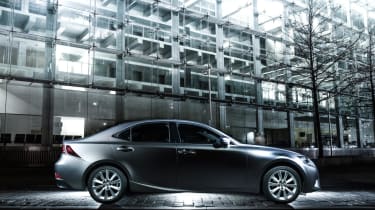Lexus IS review - price, specs and 0-60 time - Engine and Gearbox
Hybrid drive makes the Lexus IS a company car champion, though it’s less impressive to drive than its rivals.
Engine and gearbox
Two very different engine and gearbox choices here, in comparison to each other and the majority of their rivals. While the IS’s competition is slowly introducing hybrid options, none are so dedicated to the cause as Lexus, the IS’s USP effectively being its 300h model. It features a four-cylinder direct-injection 'Atkinson Cycle' 2.5-litre petrol engine mated to a synchronous electric motor and nickel metal-hydride batteries. The petrol engine develops 178bhp and the electric motor 139bhp, though the maximum combined output is a rather disappointing 217bhp. The partnered or individual output from engine and motor can drive the car independently, while the hybrid module of the drivetrain - incorporating the electric motor, electric generator, power split and motor speed reduction device - are all housed in a single transaxle casing that’s comparable in size to a conventional gearbox.
All that drives through Lexus’ E-CVT 'gearbox', a continuously variable transmission. It’s stepped to give the impression of ratios when driving it, but no amount of fiddling by Lexus has quelled its droning appetite for revs. As with the majority of hybrids there are various drive modes, including a very brief electric-only mode. Hybrid versions come with Lexus Active Sound Control, which the firm describes as ‘complementing the sound of the engine with an audio feed through a dedicated loudspeaker’. Whoever the engineer was the day it was signed off needs their ears checking, as it never sounds anything but synthesised and artificial at best, and like someone’s holed the speaker on an arcade game at worst...
The other, and largely overlooked, engine choice is a standard 2.5-litre petrol unit, though this time a V6 with 205bhp. It’s mated to a regular torque-convertor six-speed automatic and is all the better for it. Without all the hybrid technology it feels more conventional to drive, with quicker responses and a more natural sound though rivals achieve more with four-cylinder turbos, both in outright performance and overall driveability.


